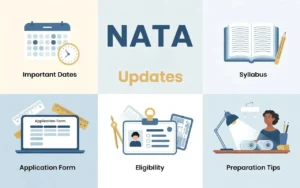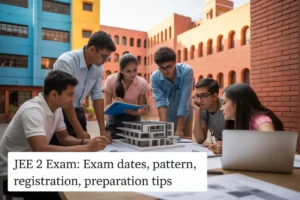The Bachelor of Planning (B.Plan) is an entry point to a great career in city design, improving infrastructure, and building sustainable communities. As India develops rapidly, with more environmental awareness than ever, planning professionals are becoming critical. JEE Paper 2B Planning is a key gateway for aspirants aiming to enter this field.
Planners are important contributors to the future of our cities, whether it is the design of inclusive urban housing plans, the development of futuristic transport systems and structures, or the integration of smart technologies into our urban landscapes. Graduates of the B.Plan program can work in various government departments, in private consultancy, in research organizations, and in international development bodies.
Why B.Plan Graduates Are in Demand
Planning professionals are the integrators of many diverse fields of knowledge: architecture, civil engineering, environmental sciences, geography, and social policy. This qualifies them to be in a special position to tackle real-world problems within the urban landscape. For aspirants preparing through JEE Main Paper 2B Coaching, the demand for skilled planners means strong career prospects after graduation.
The emergence of smart cities, the development of climate-oriented cities, and data-based planning have increased the working range of B.Plan graduates. Either in the field or at a GIS screen, planners actively contribute to the goal of making the development of urban space sustainable, inclusive, and well-attuned to the policy objectives.
Core areas covered in B.Plan include:
- Urban and regional planning
- Infrastructure and transport systems
- Environmental planning and impact assessment
- Geographic Information Systems (GIS)
- Real estate economics and land-use policy
- Planning legislation and governance
Career Options After B.Plan
B.Plan graduates can choose between multiple career tracks based on their specialization and interest. Students who have prepared with the JEE B Planning syllabus often explore opportunities in urban planning, regional development, transportation systems, housing policy, and environmental planning, depending on their area of focus.
1. Urban Planner
Urban planners take part in the development of cities to define their positive expansion and operation. They collaborate with governments, municipalities, and even private developers in setting up development plans that are like balancing the needs of housing, transport, and the environment.
They contribute to:
- Designing land-use layouts and zoning plans
- Providing services such as public schools, parks, and hospitals
- Incorporation of transport and transport-linked land development
- Partaking in smart city and regional development programs
Urban planners usually collaborate with municipalities, state planning agencies, and city urban development agencies.
2. Transport Planner
As cities become more congested, the need for efficient, sustainable transport planning has grown significantly. Transport planners use data, policy frameworks, and infrastructure design to reduce traffic problems and improve connectivity.
Their work includes:
- Designing road networks, metro corridors, and bus rapid transit systems
- Planning for pedestrian and bicycle infrastructure
- Studying traffic patterns and commuter behavior
- Integrating public transport with last-mile connectivity
They find roles in urban mobility firms, transport departments, metro rail corporations, and global consulting agencies.
3. Environmental Planner
Environmental planners make sure they do not have negative impacts on the environment that will be brought about by urban development projects. They review the possible impact on the environment and develop measures that will enhance green infrastructure and resource efficiency.
This role involves:
- Conducting Environmental Impact Assessments (EIA)
- Planning eco-sensitive zones and green belts
- Designing solid waste and water management systems
- Advising on climate-resilient urban strategies
Environmental planners are often employed by regulatory bodies, environmental NGOs, consulting firms, and multilateral development banks.
4. GIS Analyst
GIS (Geographic Information Systems) is a powerful tool used to analyze spatial data and create digital maps. B.Plan graduates with a focus on GIS are well-suited to this tech-driven role.
A GIS analyst’s work includes:
- Mapping urban infrastructure and land-use patterns
- Using satellite data to plan city expansion
- Supporting disaster management and emergency planning
- Contributing to smart city dashboards and digital twins
Tools like ArcGIS, QGIS, AutoCAD Map 3D, and remote sensing applications are central to this role. GIS analysts work in urban tech firms, real estate consultancies, and government mapping agencies.
5. Real Estate Analyst or Consultant
Real estate and urban planning are closely linked. B.Plan graduates can work with real estate developers, investment firms, or policy think tanks to advise on urban development and land-use strategies.
Key responsibilities:
- Conducting market research and location analysis
- Preparing feasibility reports for real estate projects
- Understanding land regulations and zoning laws
- Evaluating land value and return on investment
They may also contribute to housing policy frameworks or act as consultants for urban redevelopment projects.
6. Urban Designer (Postgraduate Option)
The graduates of the B.Plan program can undertake specialization by taking the course of the Master of Urban Design to study the aesthetics and geometry of the urban space. The urban designers combine creativity and design to urbanize streetscapes to achieve livability and efficiency.
They work with:
- Designing streets to be friendly to pedestrians
- The planning of city squares, open areas, and parks
- Density vs. open space
- Working with architects, landscapers, and engineers
The urban designers are usually involved in the beautification of cities, the development of new townships, and urban remodeling programs
7. Policy Researcher or Urban Economist
Those interested in academic or policy-driven work can explore research careers. Urban policy researchers study trends in housing, mobility, land use, and socioeconomic development to guide government decisions.
They may work in:
- Think tanks and policy institutes
- International development organizations (e.g., UN-Habitat, World Bank)
- Urban research wings of planning departments
- Academic institutions
The focus is on data analysis, policy writing, and socio-economic modeling.
Skills That Boost Career Growth
Although a B.Plan is a good foundation, one can develop the extra skills to make oneself competitive in the employment market.
The marketable skills are:
- Spatial data analysis and GIS
- Skills in planning software (AutoCAD, SketchUp, Revit)
- Environmental assessment tools
- Report writing and presentation
- Knowledge of urban policy
- Engagement and communication with stakeholders
Other things that can greatly help career opportunities are internships, certifications (like ESRI certifications in GIS), and postgraduate studies.
Top Recruiters Hiring B.Plan Graduates
B.Plan graduates are employed across public, private, and international organizations.
Government bodies:
- Town & Country Planning Departments
- Urban Development Authorities (e.g., DDA, MMRDA)
- Municipal Corporations
- State Housing Boards
- Smart City Missions
Private sector & consulting firms:
- HCP Design, Planning and Management Pvt. Ltd.
- CRISIL Infrastructure Advisory
- KPMG, Deloitte, PwC (Urban Strategy Teams)
- AECOM, Jacobs, IPE Global
International organizations:
- UN-Habitat
- World Bank
- Asian Development Bank (ADB)
- GIZ
- National Institute of Urban Affairs (NIUA)
Planning for a Purposeful Future
A Bachelor of Planning leads to careers that make a difference, whether it is the development of smarter cities, better transport networks, or sustainable neighborhoods. It is a program that combines creative, engineering, and policy skills and training, producing leaders of the future cities. For many aspiring planners, clearing the JEE Main Paper 2B is the first step to entering this fascinating field.
With India increasingly concentrating on urban development and the world steering towards a sustainable way of life, the field of planning has become more than just a career option. It is one of the means to add value in society and contribute to long-term change.
At Architecture Tutorials, we are committed to providing top-quality JEE Main Paper 2B coaching, combining flexible classes, expert faculty, and comprehensive guidance to help students excel in planning-focused entrance exams. Our training goes beyond exam preparation, building essential skills in GIS, urban design, and regional planning that empower learners to step confidently into the planning profession. Through well-structured materials, engaging sessions, and practical teaching methods, we ensure that both students and professionals gain the knowledge, skills, and confidence needed for a successful career in urban and regional planning.
Read to know more: JoSAA Counselling Guide for Admission to NIT BArch Courses






